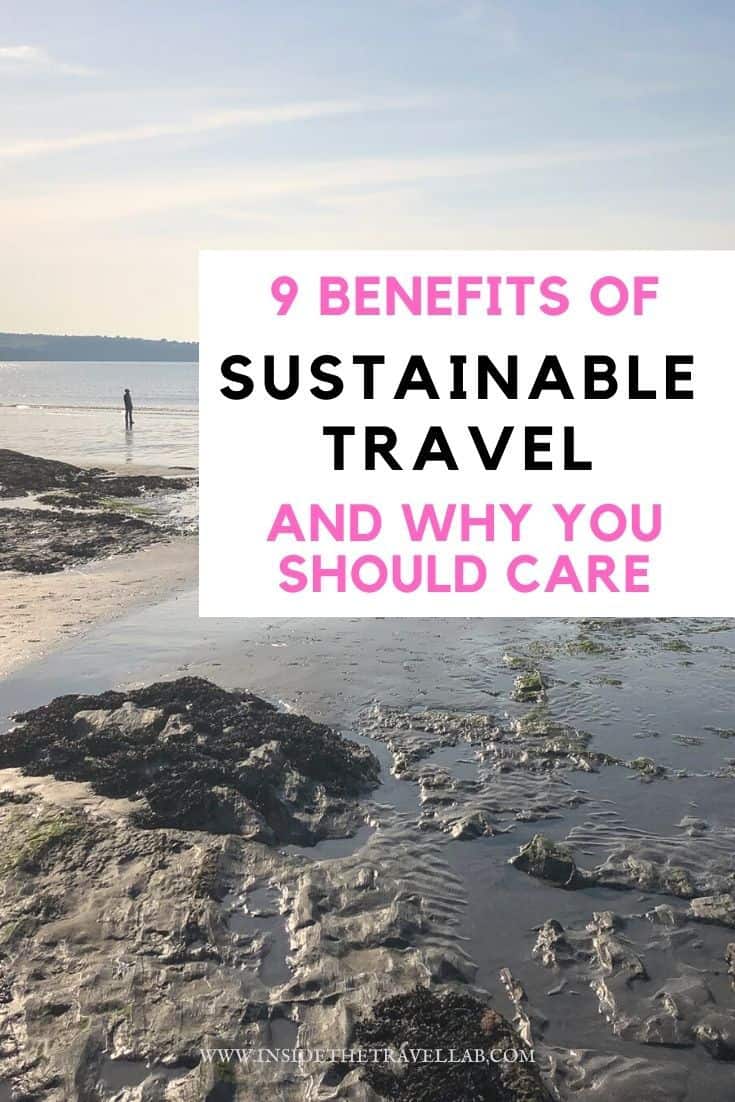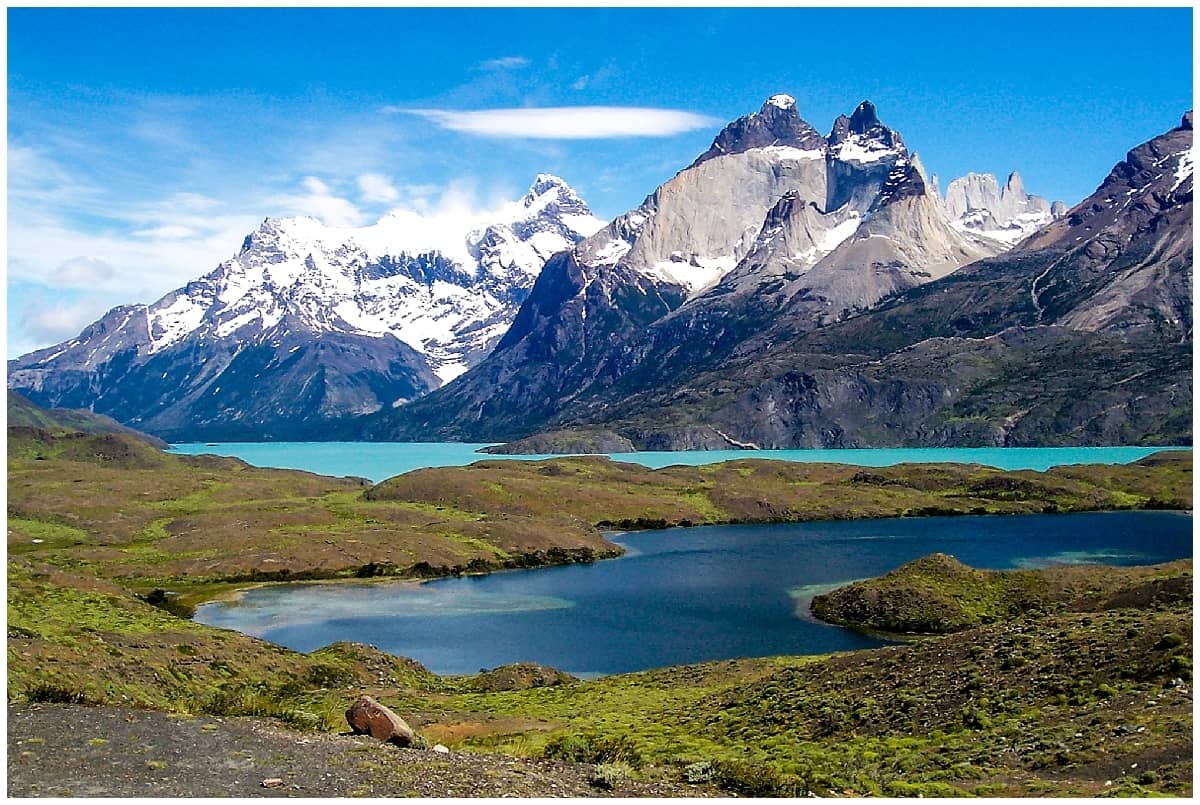Let’s talk about the benefits of sustainable tourism. No, not just the part that tries to make you feel guilty and then fob you off with a bamboo toothbrush. But real, powerful, meaningful benefits. Turns out that travel is good for the planet. Let’s go.

What is the Definition of Sustainable Tourism?
Gah, sustainable tourism. It’s sexy but it sure doesn’t sound like it.
The UNWTO Definition: “Tourism that takes full account of its current and future economic, social and environmental impacts, addressing the needs of visitors, the industry, the environment and host communities”
Yet it’s more than just green travel or responsible travel or even eco-friendly travel. The emphasis on sustainability refers to lots of different, important considerations. But one of them, is that people should be having fun. Otherwise, we’re missing the point.
With that in mind, let’s talk more about some of the top benefits of sustainable tourism.
The Benefits of Sustainable Tourism

1. Sustainable Tourism Directly Helps Save Endangered Animals
What’s the most powerful way of protecting endangered animals? Making them more valuable alive than dead.
And with sustainably run wildlife encounters, that’s exactly what happens. When communities earn their living by drawing visitors to see and appreciate wildlife in their natural habitats, the pressure to poach diminishes. The benefits of sustainable tourism extend beyond the travel industry as entire regions begin to see preserving local species as economically beneficial, as well as just morally so.

2. Sustainable Tourism Protects Landscapes and Environments
Just as with endangered animals, sustainable tourism creates a massive incentive for communities to protect landscapes as well as the creatures that live within them. While areas can be fenced off by authorities simply for their own protection, one of the benefits of sustainable tourism includes an income for the people who live nearby while also financing the protection of the area in question. And it’s not just “landscapes.” Marine life and aquatic environments can also benefit from the positive impact of sustainable tourism.
Note, this is generally the opposite of overtourism.

3. Sustainable Tourism Reduces Pollution
While sustainable tourism protects against poaching and the active destruction of habitats, as mentioned above, it also helps to reduce pollution.
With extra incentives to keep local areas clean to earn an income from visitors, it is easier to to get group cooperation to reduce pollution on an individual level, and a corporate and government level.

4. Sustainable Tourism Shares Knowledge
While “bad tourism” herds people into resorts where they have no idea where they are or what local traditions look like, sustainable tourism invites visitors and residents to share their experiences, exchange knowledge and have fun.
- Recommended reading: Learning about Jordanian food in Beit Sitti

5. Sustainable Tourism Prevents Cash Crops and Protects Livelihoods
Mass industry and thoughtless mass tourism leads to cash crops and precarious livelihoods. Areas can find themselves supported by only one crop or one corporation and then it only takes one small change in circumstances, like a hurricane or corporate failure, for the entire area to struggle.
Sustainable tourism encourages a diverse approach to accommodation, food, farming and the preservation of tradition in local communities.
With smaller boutique hotels, cooking classes, agroturismo and the tours woven into the tourism industry, communities are left less at the mercy of external events and the disadvantages of cash crop economies.
- Recommended reading: The Cheese Route in Austria and What does agroturismo have to teach in Greece?

6. Sustainable Tourism is Good for Your Health
Whether we’re talking physical health or mental health, one of the benefits of sustainable tourism is wellness.
Clean air, clean water, sustainable farming practices and beautiful natural landscapes are each known to improve health on a population level.
And laughter and meeting new friends helps too. Seriously. It’s all scientifically approved!

7. Sustainable Tourism Protects and Preserves Valued Traditions
Traditional practices bind cultures together. Almost by definition, they are sustainable and have survived for centuries when we all had far less. Yet globalisation threatens many traditional practices.
In the modern world, where is the market for all the artisanal produce and practices? Responsible tourism helps to bring together traders and customers for small, traditional practices, from gin distilleries to hand-woven carpets to any and every kind of local culture and tradition.
For examples, see:

8. Sustainable Tourism Doesn’t Require Charity
Sometimes, the best of intentions result in the most harm. Several efforts to help alleviate the 1980s famine in east Africa, for example, resulted in harm that lasted for decades.
Sustainable travel seeks a win-win situation.
It demands a formula that works for today and tomorrow.
A method that benefits tourists and local communities, that conserves the environment and which, crucially, is both affordable and makes enough money to keep the whole show on the road.
In the words of a banker turned philanthropist.
“If we become a loss-making organisation, we are no help at all. We must be stable and sustainable. Running a business that depends on yearly grants and fundraising provides no security at all.”
Jean-Marc Debricon, founder of the Green Shoots Foundation.
Truly sustainable travel should support the local economy and local people without creating a dependency on fundraising or aid.

9. Sustainable Tourism Feels Good!
Travel is one of the most joyful and rewarding things we can do with our lives on this planet. People on their deathbeds don’t wish for more time in the office or better clothes. They wish for more time with their family and their friends, and to have travelled more.
One of the many benefits of sustainable tourism is also one of the simplest: it just feels good!
In Summary: The Benefits of Sustainable Tourism
- Protects endangered animals
- Protects landscapes and marine reserves under threat
- Reduces pollution and protects natural resources
- Shares knowledge
- Protects livelihoods and brings economic benefits
- Promotes health
- Develops independence
- Feels good!
What Sustainable Tourism Is Not
Sometimes, it’s easier to understand the benefits of sustainable tourism by talking about the opposite. What sustainable tourism is not.
Not Just a “Third World” Problem
Leaving aside for a moment the terminology, sustainable tourism applies to everyone everywhere. The Palace of Versailles outside Paris needs to manage the principles of sustainable tourism just as much as the Amazon rainforest does.
Not Paternalistic
It’s not about “rich white saviours” deciding what’s best for other people and their land. It’s about everyone working together.
Not Just Being Green
Ecotourism or green travel makes protecting the environment the main concern. Sustainable tourism goes further than that. It looks at protecting people, their culture and their future as well as their past. It also focuses on the traveller having a good time in whichever way that feels meaningful to them.
Why? Because…
It needs to make a profit to be economically sustainable.
Here’s the sustainable part. It has to make money. It cannot be a setup that relies on donations, which could stop at any time, or that relies on the traveller feeling good about feeling bad.
Some industries can just about pull that off. But travel cannot because…
“Travel is my one time to relax and take a break, goddammit!”
Not A Chore
Tourism has to be sustainable. Which means that it has to be manageable (and I’d wager pleasurable) to the traveller as well as the host community. That’s something that green travel and ethical travel and ecotourism occasionally lose sight of.
Responsible travel is almost the same thing. But it doesn’t sound much fun, does it?! What happened to taking a break from some of our responsibilities for a short while?!
And finally, we can all be very responsible for a short period of time. But is there a system in place that makes being responsible sustainable? That’s the key question.
In Summary: What Sustainable Tourism Is Not
- For “third world” countries
- About “being green”
- “White saviours” dictating terms
- No fun for the traveller!
FAQs About Sustainable Tourism
Who benefits from sustainable tourism?
Everyone. Both locals and travellers and people who never visit the destination.
What is sustainable tourism?
It’s a model of tourism which benefits both people and places, as well as the environment and is economically sustainable on its own.
Why is sustainable tourism difficult to achieve?
I’m not convinced that it is, with the right mindset. But there is a temptation to cut corners and exploit natural resources for the fastest or cheapest result instead of the most beneficial one.
What are the benefits of responsible tourism?
All of the above!
Sustainable Living: The Key Takeaway…
We can’t wait until we’re perfect to start doing something better.
More on Sustainable Travel
- Start here: how to be a responsible tourist
- Is dark tourism ethical? What you need to know.
- Get inspired by this collection of the best sustainable travel blogs.
- The unmistakable emotional meaning of home
- Why you need to know about the cork trees in Portugal
- The importance of doing nothing
- How to find the most ethical travel destinations
- 15 sustainable beach tips for your next trip to the sea
- Five Ways Travel Can Help the Planet – rethinking Earth Day
- Voluntourism – the questions you should ask by Uncornered Market


The positive of sustainable tourism is to ensure that development is a positive experience for local people, tourism companies, and tourists themselves.
I don’t know about before reading your article. Thank you so much for sharing such a valuable information.
Many efforts at sustainability focus on the environment, some on the residents. But for true success, we need to consider all three components. Thanks for stopping by!
Sustainable tourism is the key to establishing the balance between development and nature. It is indeed true that it helps protect endangered animals and birds, protects landscapes and promotes a healthy lifestyle. One such example is the Khonoma Village of Nagaland in India. The villagers were once hunters but now is mainly known for their preservation efforts, ecotourism and sustainable tourism
Thanks for the recommendation! Hope to check it out one day.
You’re welcome Abi. Dzulekie is another village near Khonoma known for the same.